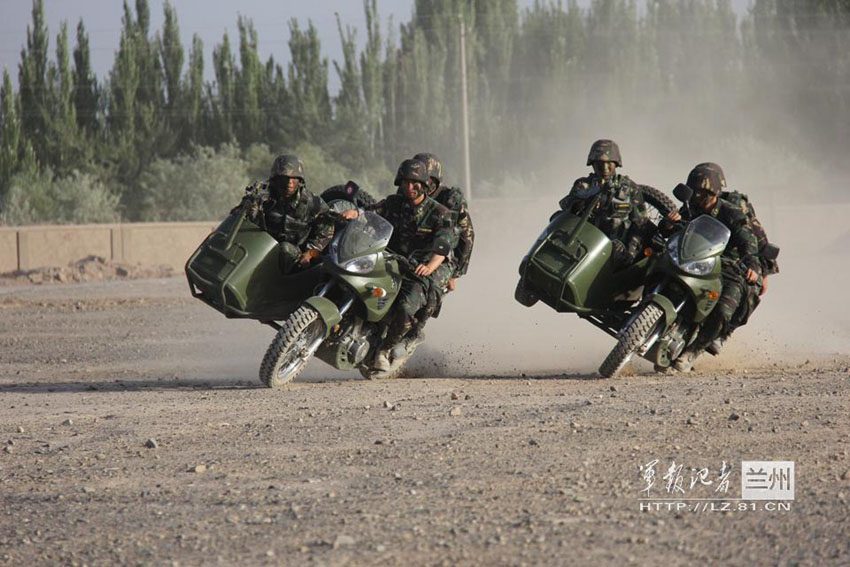 Avant-garde approach to graduation photos
Avant-garde approach to graduation photos
 Early PLA posters, signatures of an era
Early PLA posters, signatures of an era
 First Russian Street in Tianjin open to public
First Russian Street in Tianjin open to public
 Motorcycle stunt on the Bund
Motorcycle stunt on the Bund
 French Spiderman Alain Robert climbs up Galaxy Hotel in Macao
French Spiderman Alain Robert climbs up Galaxy Hotel in Macao
 Africans in Guangzhou
Africans in Guangzhou
 Pole dancer shows strength and beauty up in the air
Pole dancer shows strength and beauty up in the air
 College girls call for protection of ecological space on earth
College girls call for protection of ecological space on earth
 Top 10 celebrities driving auto brands
Top 10 celebrities driving auto brands
 10 low-carbon tips to save money
10 low-carbon tips to save money
Once little more than a word in Hollywood films, "terrorism" now is a common political term and, unfortunately, a real threat on China's streets.
An explosion occurred at a railway station in Urumqi, capital of northwest China's Xinjiang Uygur Autonomous Region Wednesday evening. It is not clear if it is a terrorist attack, but it certainly provokes memories of the killing spree at a crowded station in the southwestern city of Kunming in early March.
President Xi Jinping on his recent tour to Xinjiang vowed to deploy a "strike-first" strategy against terrorism in a bid to deter enemies and inspire people.
Kashgar, in the most western part of Xinjiang, has witnessed several deadly terrorist attacks in the past few years. Dropping by a police station there, Xi told police officers that the better they prepare themselves in everyday training, the more likely they are to avoid bloodshed in real encounters with terrorists.
The Xinjiang visit followed a meeting of the Political Bureau of the Communist Party of China Central Committee on national security and social stability last Friday, with antiterrorism the main topic. In his speech at the session, Xi described antiterrorism as "essential to national security, people's basic interests and the country's reform, development and stability".
He did not exaggerate.
Terrorists savagely slaughtered 29 innocent civilians and injured over 140 in the Kunming station attack.
It is hard not to connect the Kunming killing with another attack last October, in which separatists drove a vehicle into a crowd of tourists in Tian'anmen Square in Beijing, killing five and injuring 40.
Separatists appear to be shifting their focus from symbols of the government -- such as public security stations and police vehicles -- to random, ordinary civilians, and operating in areas outside Xinjiang.
Terrorism, separatism and extremism has never stopped in Xinjiang and is harder to contain due to the Internet and other new technology.
There is every reason, immediate and long-term, to upgrade precautions against terror and to prepare society for real engagement.
For a country relatively new to the field, there is much to be done.
It will start from the government. At last Friday's session, President Xi pledged high intensity action to improve counter-terrorism abilities and to work with the public to build a "wall of bronze and iron".
Despite increasing economic and political strength, China is in a less safe world.
Two weeks ago, in the first meeting of the national security commission which Xi leads, he brought up the concept of comprehensive national security, ranging from politics, territory, military, economy to natural resources. When explaining this idea, Xi noted that China will pay equal attention to traditional and non-traditional threats. Terrorism no doubt falls in the latter category.
Accompanied by higher economic and political stakes, the country will face more and more complicated security threats, but will be better prepared when the leadership has a clear vision and resources are properly allocated.
Judging from the precedents, the battle against terrorism is long and painful with failure and success. China may have a good chance if it starts early enough.
 The Western Qing Mausoleum
The Western Qing Mausoleum Overseas returnees strive for dreams in Beijing
Overseas returnees strive for dreams in Beijing Fried up: Chili pork bonanza in Central China
Fried up: Chili pork bonanza in Central China Hand-painted maps go viral online
Hand-painted maps go viral online 4th Beijing Int'l Film Festival ends
4th Beijing Int'l Film Festival ends Commando elite specializes in sign language
Commando elite specializes in sign language Man photoshops himself into girlfriend's childhood photos
Man photoshops himself into girlfriend's childhood photos Photo story: Stallholders at Beijing Zoo Wholesale Market
Photo story: Stallholders at Beijing Zoo Wholesale Market Artists on backstage
Artists on backstage 'African Street' in Guangzhou
'African Street' in Guangzhou Special operation members in comprehensive training
Special operation members in comprehensive training Cute Shaolin boy melts the hearts of millions
Cute Shaolin boy melts the hearts of millions Giant panda Sijia is back to happy life
Giant panda Sijia is back to happy life Richest Chinese of 2014: half from the mainland
Richest Chinese of 2014: half from the mainland Chengdu - laid-back lifestyle makes happiest city
Chengdu - laid-back lifestyle makes happiest cityDay|Week|Month